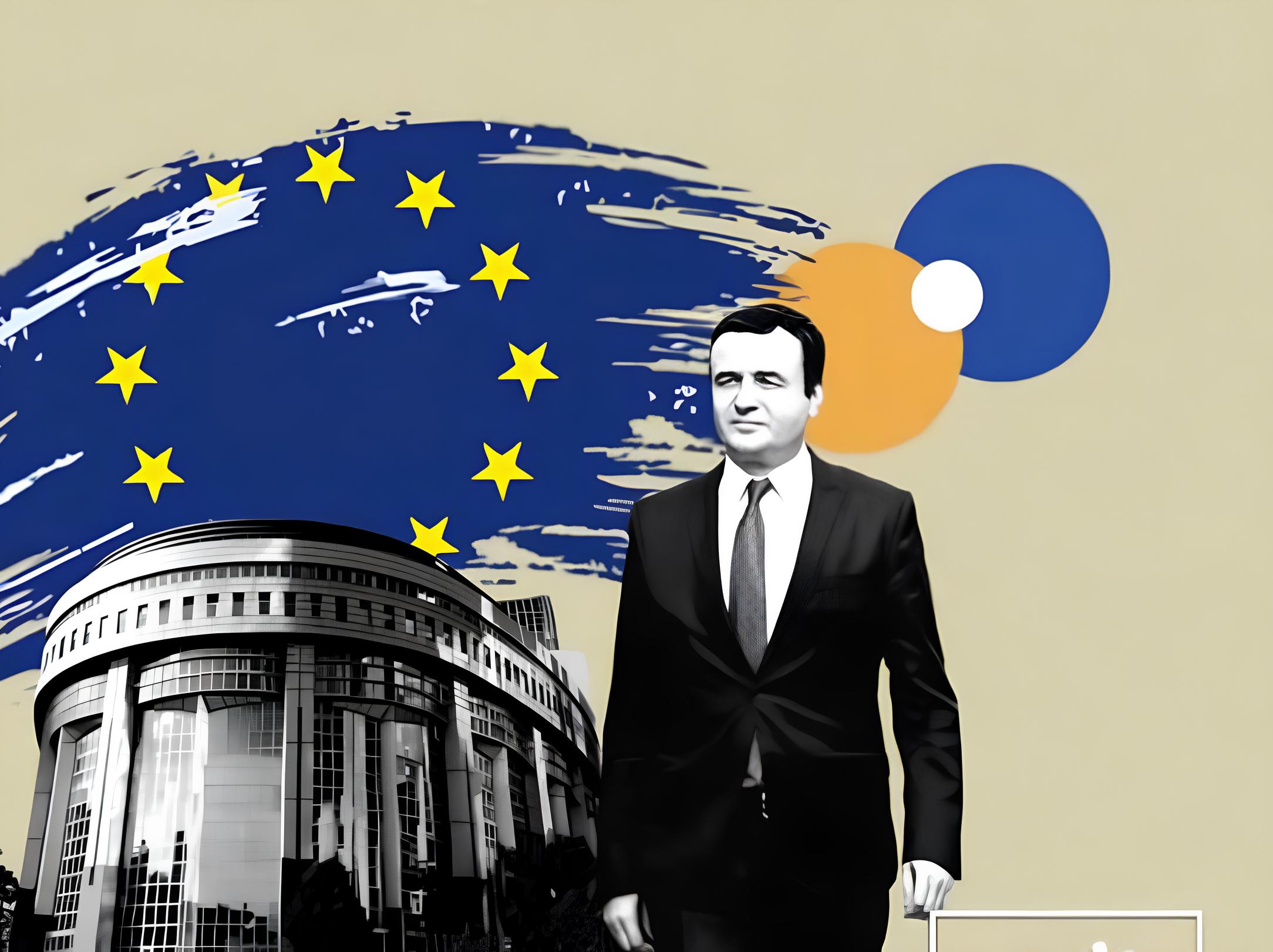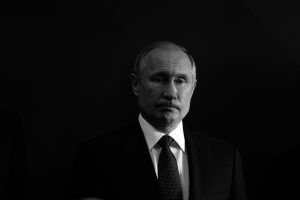
Is the European Union’s attitude towards Kosovo motivated by security needs or hypocrisy?
December 22, 2023
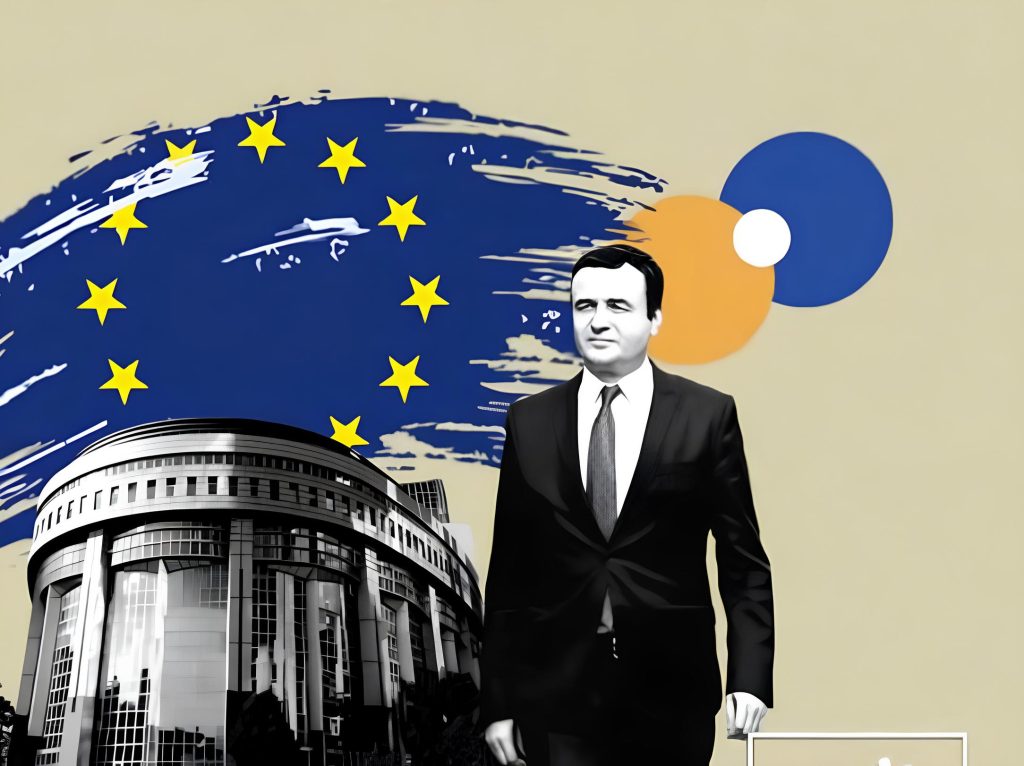
Vicious Circle : Kosovo’s Europeanization Process Inside the Union:
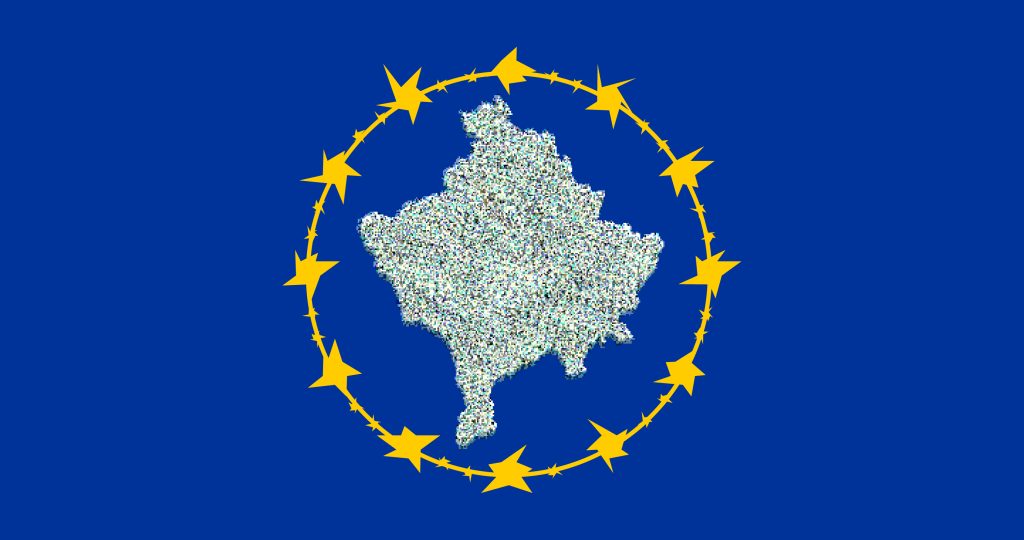
Kosovo’s process of “becoming European within the Union”, so to speak, can be said to have started on 17 February 2008, when it declared its independence. The European Union’s follow-up to the independence referendum held in the parliament established by the Republic of Kosovo, the non-recognition of Kosovo by Serbia and 5 of the 27 EU member states, the need to draw attention to the negotiations between Pristina and Belgrade and the EU’s “abstract steps” regarding the dialogue were observed.
Despite these abstract steps of the EU, the harmonisation with the UN Security Council Resolution 1244 on Kosovo ensured that Kosovo was not prevented from joining the Stabilisation and Association Process, which aims to integrate its legal, economic and social policies with the EU in order to qualify for EU membership in the coming years. In addition, the EU has deployed police and civilian resources to stabilise the Republic of Kosovo under the European Union Rule of Law Mission (EULEX), which continues to operate.
By 8 July 2010, although the European Parliament called on all member states to recognise Kosovo, in October 2010 it was announced that Kosovo could be included in the Schengen area despite the existence of member states that did not recognise Kosovo’s independence, and that countries wishing to become a member of the EU would first recognise Kosovo, and although this rapprochement brought Kosovo closer to EU values. This rapprochement was just a promise and no steps could be taken, The European Union, which could not get out of the Belgrade axis, included a country that experienced one of the bloodiest wars of the period between 1998-1999 and established its independence in 2008 in the Monetary Fund programme only for the use of the Euro, and concrete steps regarding full membership or the Schengen area could not be taken.
On 6 February 2018, the European Commission included Kosovo in its enlargement plan for the six Western Balkan countries and reported on Kosovo’s engagement with EU values. The so-called 2018 European Union Report does not recognise Kosovo’s commitment to visa liberalisation, even though the actions of the Kosovo Government in 2017 towards the parliamentary and municipal elections and its praise for the integration of Serbian judges and prosecutors into Kosovo’s own judicial system have led to the perception that Kosovo is one step closer to the European Union.
The report, while praising the integration of Serbian judges and prosecutors into the Kosovo judicial system, also noted the vulnerability of the judiciary to undue political influence and called for efforts to improve the rule of law and the effectiveness of institutions and also highlighted shortcomings in the fight against organised crime and corruption, noting in particular the small number of final convictions. At least in 2018 the Haradinaj government, which was in govern at the time, claimed that visa liberalisation had become impossible under the pretext of “unfulfilled criteria”, despite the optimistic attitude of the 2018 report and its recommendations for Kosovo to address the shortcomings related to corruption and organised crime. In particular, “Kosovo has done its part.
Kosovo rightly expects the EU to recognise this progress and the relevant mechanisms to give the green light for visa liberalisation as soon as possible.” With this statement, even if Kosovo turned its focus entirely to the EU, visa liberalisation and concrete steps towards membership were replaced by a tragedy of congratulations and criticism.
Visa Liberalisation, then After?
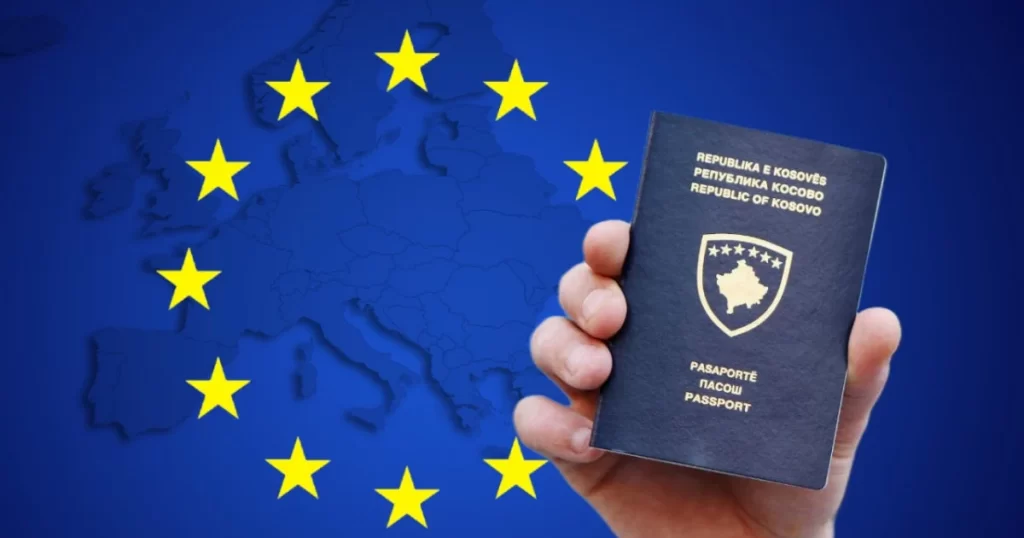
The agreement signed between the parties in April 2023 and expected to enter into force in January 2024 was an important indicator that the EU started to take concrete steps and Kosovo citizens were granted visa-free travel to the European Union countries. In particular, Kosovo’s fulfilment of all the criteria set out in the Visa Liberalisation Roadmap since 2018 played an important role in ensuring this right. Although the development of visa liberalisation for Kosovo Albanians started with hope, the subsequent development caused dark clouds to replace this hopeful mood.
The murder of Kosovo Albanian police officer Afrim Bunjaku by Serbian terrorists was the beginning of a difficult test for Albin Kurti, chairman of the ruling VV Party, former activist and current prime minister of the Republic of Kosovo, which led to increased traffic between Pristina and Belgrade and raised many concerns about the future of mediation efforts. Kurti has managed to attract the attention of both Kosovo and diaspora Albanians as a political figure who, unlike other politicians in Kosovo, advocates pan-Albanianism, who, from a foreign policy point of view, does not want the United States and the European Union to have a say in Kosovo’s decisions, and who advocates full independence.
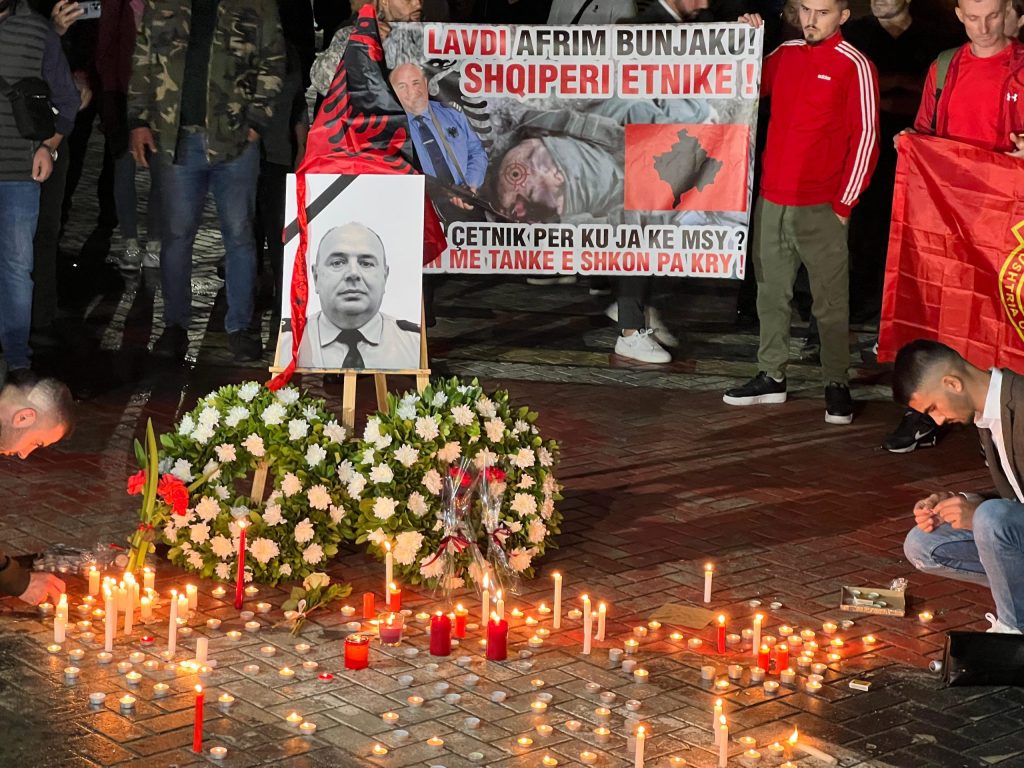
Commemoration in Tirana after Bunjaku was killed by Serbian terrorists
The body of Bunjaku, who was killed when 30 masked men in combat uniform opened fire on a police patrol near the village of Banjska in the northern Mitrovica region, was buried with a ceremony. The killing of Bunjaku by Serbian terrorists caused a great mourning within the country and increased tensions at a time when the Pristina – Belgrade line was trying to be normalised and caused the disruption of the practices that were planned to bring these two countries closer to EU membership and started certain questioning of EU countries on visa liberalisation.
In the aftermath of the incident, some Albanian writers have argued that it underlines the failure of the European Union-led negotiations to resolve relations between Serbia and Kosovo, with many questions remaining unanswered two weeks after the attack. At the same time, some European Union spokespersons were saying that measures against Kosovo were still in force due to the lack of “satisfactory(?)” steps to reduce tensions in the region, and Macron’s statement and rhetoric at the Berlin Process Summit in Tirana, Albania, on 18 October 2023 helped to create a climate of tension and showed that the measures were in place.
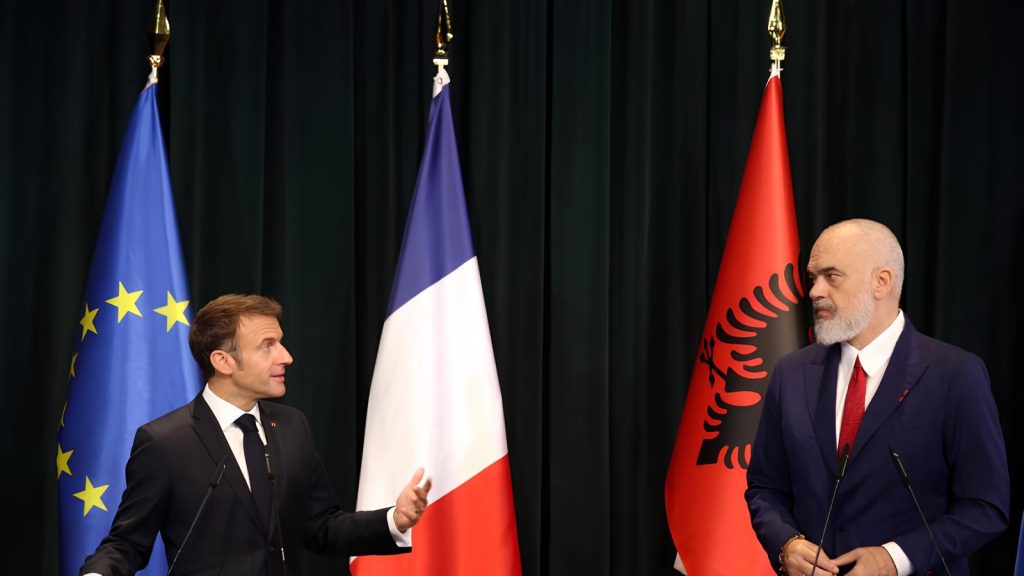
Emmanuel Macron and Edi Rama at the Berlin Process Summit in Tirana
Macron said: “I say this with great clarity: We made a gesture of trust on the visa issue. As far as France is concerned, it is suspended out of respect for the promise made and today the promise is not kept. I expect a real commitment from these two authorities to move forward in the coming weeks. This is the condition for peace throughout the region.” We should have realised that for France, the position of Pristina and Belgrade is crucial for the security and stability of the European Union. For this reason, France has taken into account the economic and political functioning of the European Union in this development.
In response to Macron’s statement, the European Parliament’s Visa Rapporteur Thjis Reuten stated that Kosovo citizens will be able to travel to European countries from 1 January and that France’s position is not the same as that of the EU and that President Macron does not have the authority to change it.
However, “the liberalisation of visas for Kosovo will apply from 1 January 2024. This decision was taken unanimously by the Council months ago. France’s attempt to cancel this decision is not the position of the EU, and President Macron does not have the authority to take such steps unilaterally,” Reuten said, adding that Macron is undermining the Pristina-Belgrade dialogue and would be an obstacle to punish Kosovo, This reckless move exacerbates the already uncertain situation in the Belgrade-Pristina dialogue.
This discussion should not be part of our efforts to normalise relations between Serbia and Kosovo, because it has nothing to do with it. It will encourage Serbia to obstruct the necessary normalisation, instead of the much-needed good faith engagement between the two countries facilitated by the EU,” he said, seeking to allay Kosovo’s concerns about visa liberalisation.
The European Union’s establishment of visa-free access for short-term resident for Kosovar Albanians was seen by some as proof of the EU’s stalling tactics. While visa liberalisation allows for multiple visits of up to 90 days within a 180-day period, it still requires a passport. The procedures for providing reasons for travel, hotel and address details, return ticket reservation, and financial statements are the same as those for non-EU or non-Schengen area citizens. However, it should be noted that visa liberalisation does not extend to education and employment, which not only hampers the exchange of information but also prevents the acquisition of capital and savings.
Overall the European Union’s approach towards Kosovo’s integration into the EU seems to be contingent on political stability and progress in areas such as democracy, the rule of law, and fighting corruption. It is unclear whether the EU intends to exhaust Kosovo in this process without actually pushing it out of the union, or whether the EU aims to include a stable and corruption-free Kosovo. The future will reveal the EU’s true intentions. While visa liberalisation is a significant step towards EU integration for Kosovo, it is important for Kosovo to be mindful of the possibility of reversing this step and adjust its agenda accordingly. It is necessary to consider that even if political stability and corruption elimination are achieved, membership in the EU may not be guaranteed, prompting Kosovo to take strategic measures accordingly.
A curated seletion of FA’s must-read stories.
Written By: DILARA SAHIN
Written By: RIZWAN RAFI TOGOO
Written By: ERIC SONG
Written By: BATUHAN GUNES
Written By: E. ERDEN
Written By: SHOHREH POOLAB
Written By: ALEYNA TASTAN
Written By: CIHAN KAAN GAZI

Alperen Morova is a student of Political Science and International Relations at Bahçeşehir University,He has a personality that is open to innovations, researches, and loves to read. His research interests include Cybersecurity, Baltic Studies, Migration Studies, Public Opinion, Sustainability, Youth Policy, Civil Society Organisations, Albanian Studies, Post-War Kosovo, Voting Behaviour and Morova follows various sources related to these fields.
Written By: GABRIEL RAMIREZ
Written By: DILARA SAHIN
Written By: DILRUBA YILMAZ
Written By: NILAY CELIK
Written By: ELDANIZ GUSSEINOV
Written By: JOSEF SCHOEFL
Written By: SELCAN BEDIRHANOGLU
Written By: FATIH CEYLAN
FA’s flagship evening newsletter guilding you through the most important world streis ofthe day. Delivered weekdays.
